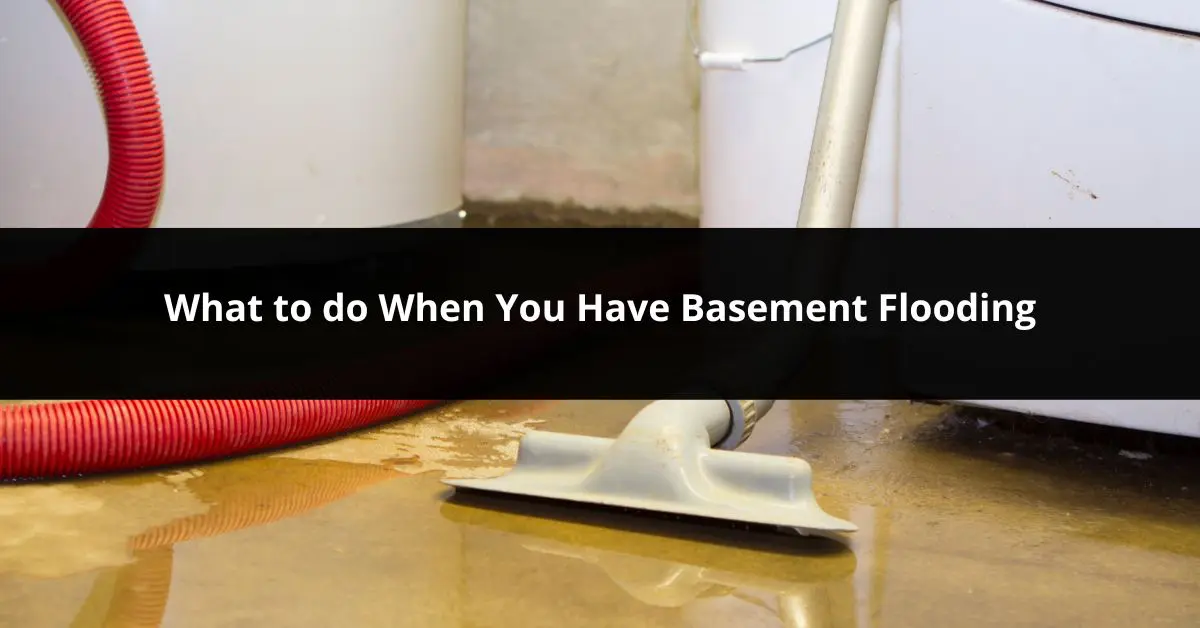If you have a flooded basement, don’t panic! According to multiple sources like this one and this one, 98% of all basements experience water damage at some point. The trick is to have a plan!
And that plan starts with identifying what caused your basement to flood in the first place.
Common causes of basement flooding include:
- Plumbing leaks
- Leaking/Burst pipe
- Leaky windows
- Leaky foundation
- Sump pump stopped working
- Sewer backup
- Storm drain backup
- Power outage
- Leaking appliances
- Overflowing rivers and creeks
- Flash flood
- Cracks in the foundation
Once you’ve identified the cause of the flooding, it is time to take action.
There are 5 steps to take when your basement floods:
- Make sure it is safe.
- Call your insurance company.
- Find the source of the water.
- Remove the water.
- Assess the damage.
Step 1: Make Sure It is Safe
Don’t “dive” head first into your flooded basement without taking the proper precautions. These include:
- Turn off the gas and electricity to your home.
- Wear rubber-soled boots and gloves to minimize your risk of electrical shock.
- Do not touch any electrical devices until your flooded basement has been completely dried out.
Pro-tip: If you smell rotten eggs or if the water has light brownish gray tinge, do not go into your basement. This is a sign of a sewage backup or gas leak. Instead, call a professional immediately, and you may need to evacuate.
Step 2: Call Your Insurance Company
Call your home insurance company and start an insurance claim. Your agent will confirm your coverage limits if your hazard insurance or homeowners insurance covers basement flood damage. They’ll also give you the deductible amount and claim procedures.
Bonus-tip: Take pictures of the damage so you know exactly what was damaged, the condition of the destroyed items, and the rooms that are affected. Your insurance will most likely ask for them and being prepared may help speed up the process.
Step 3: Determine The Source Of The Water
If you aren’t sure why your basement has turned into a swimming pool, one of the first things you should do is find the source of the flood water.
Start by looking for:
- Water pooling up against your home.
- Gutters overflowing.
- A sump pump that did not turn on.
And be careful! Do not go near the water if it is discolored or has an odor.
For flooding caused by weather you most likely will not have to worry about more water coming in, and you can start cleaning up your flooded basement. If a leaking pipe or a sump pump failure caused your basement flooding, you will need to fix that problem first before attempting to remove the water. Otherwise it will be like tossing water out of a boat with a hole in the bottom.
Step 4: Remove The Water
In almost every case of basement flooding, you should call a professional first as they know what to look for and can determine what is safe and what is not.
Most standing water can be removed with towels, mopping, fans, a wet vac, water pumps, and dehumidifiers. Once the excess water is gone, start drying the area out and you’ll be able to figure out what can be salvaged.
Step 5: Assess The Damage
After the flood in your basement has drained, take a look at what repairs need to be done to get back to normal like:
- Anything that the flood water touched which needs to be thoroughly cleaned or thrown out.
- Wet carpeting, drywall, paneling, and insulation.
- Floors and walls that need to be scrubbed with a diluted bleach solution to disinfect them and help kill mold and bacteria.
Take action as soon as you’re able to. If the water damage is left untreated, your house will deteriorate.
Here are some examples of what you can expect to happen:
- Particleboard cabinetry and furniture will start weakening and eventually crumble over time.
- In 48 hours or less, clean or grey water can deteriorate to black water and become toxic.
- Fungi and mold will grow.
- Painted walls will blister and wallpaper will start peeling away.
- Your home’s framing will swell and split.
- Wood floors will warp and be unsalvageable.
- The drywall will crumble while the home’s structural integrity declines.
- Foundation damage will become apparent and could lead to more substantial problems.
- Infestations could find the wet and moldy basement and now you have to hire an exterminator.
Whether your basement flooding is caused by a hundred-year flood or your sump pump quit working, you now know what to do if your basement floods. If the damage is too great and the cost to repair is too high, call us at . We buy houses with flood damage, foundation problems and other issues all the time.


